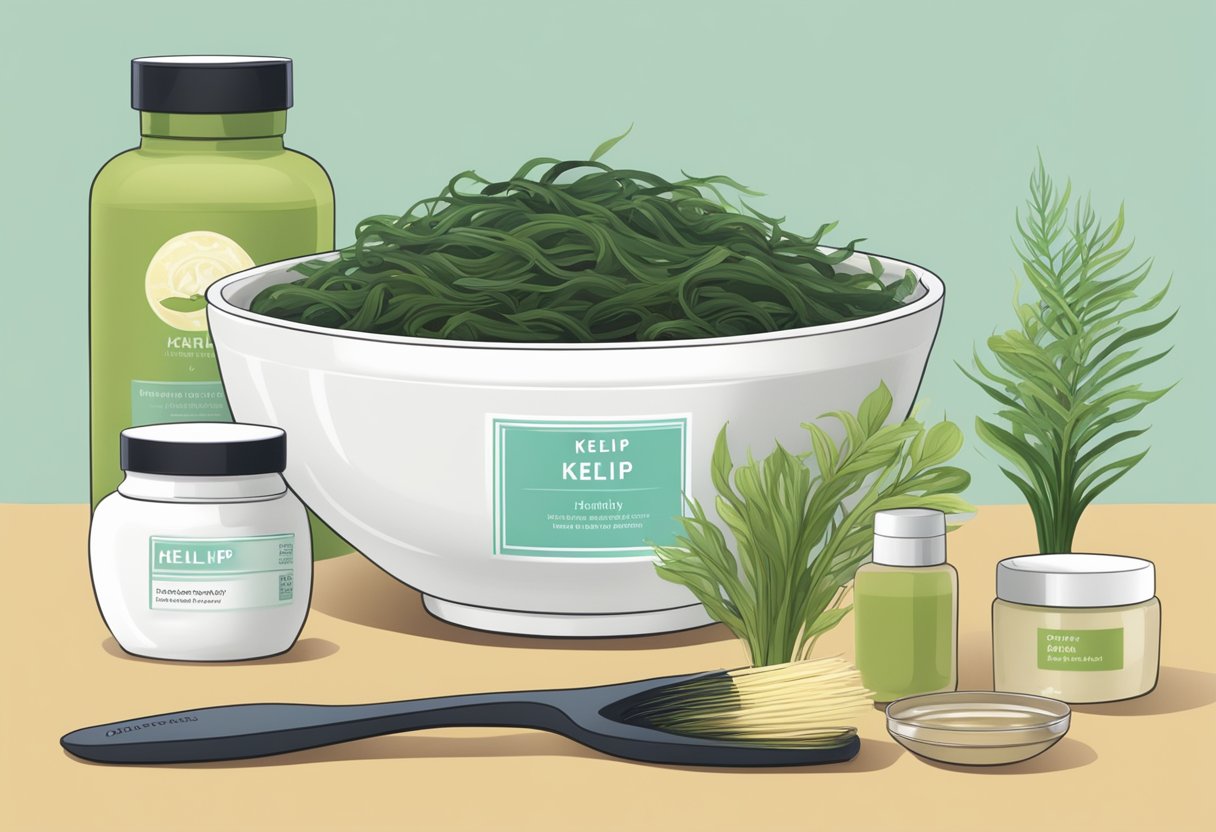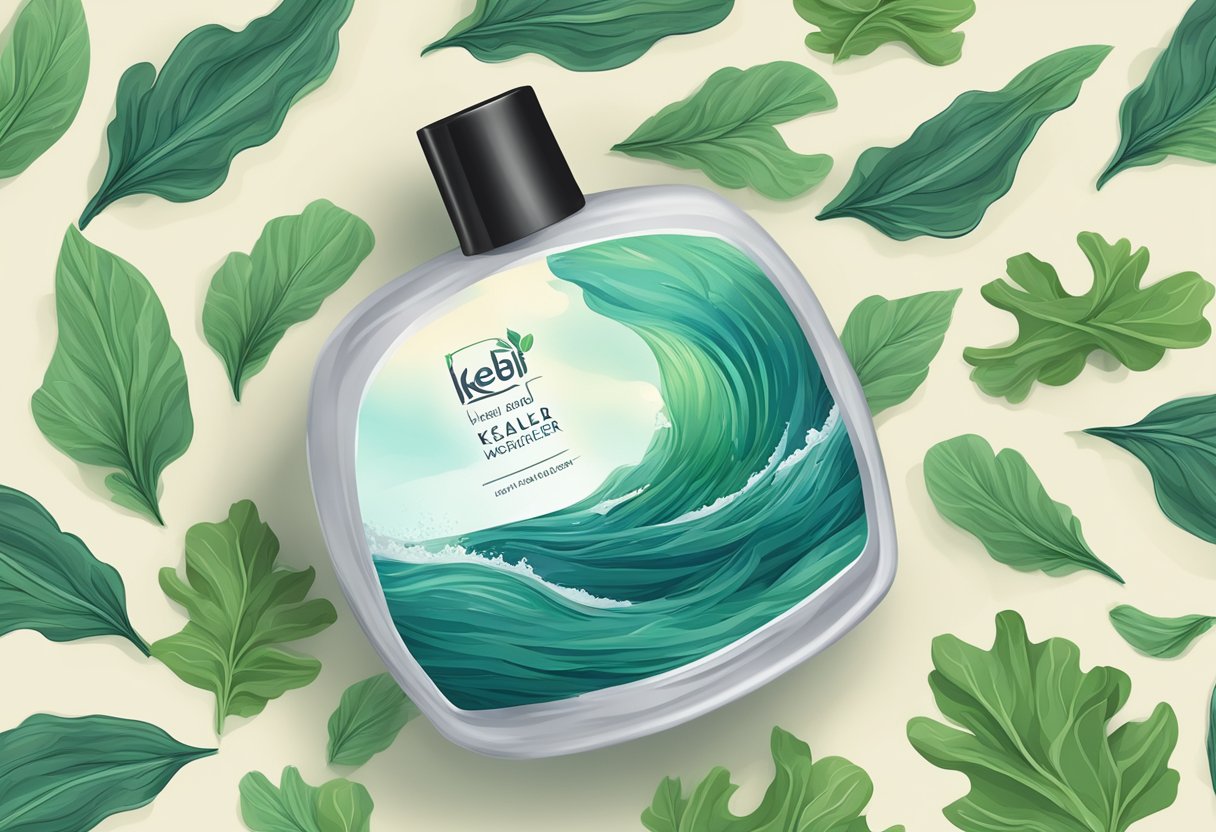Kelp is gaining popularity as a natural remedy for hair care. Rich in vitamins and minerals, it contains a unique composition that benefits hair health. For instance, the high iodine content is essential for thyroid gland function, which, in turn, plays a significant role in hair growth and texture. Additionally, kelp is a source of vital nutrients such as iron, l-lysine, zinc, and antioxidants, all of which contribute to maintaining a healthy scalp and hair strands.
Among the sea kelp benefits for hair, promoting hair growth is a standout. Its mineral-rich profile aids in nourishing the hair follicles, potentially leading to improved hair growth. Kelp also has moisturizing properties that can help in hydrating the scalp and hair, preventing dryness that often leads to breakage. Furthermore, kelp can help to strengthen hair strands, making them less prone to damage and increasing their resilience to environmental stresses.
Incorporating kelp into a hair care regimen can also help prevent hair loss by reinforcing hair roots and improving circulation in the scalp. The nutrients in kelp can enhance hair texture and shine, ensuring hair not only grows healthier but also appears more vibrant. With regular use, the protective effects of kelp against daily damage from heat styling and sun exposure become evident. However, while the benefits are numerous, it's essential to consider proper usage tips and address frequently asked questions to maximize its effectiveness and avoid potential side effects.

Key Takeaways
- Kelp offers a rich array of nutrients that promote hair growth and improved scalp health.
- Its moisturizing properties help in hydrating the scalp, reducing breakage, and strengthening hair strands.
- Regular use of kelp in hair care can lead to enhanced texture, shine, and protection against environmental damage.
The Nutritional Profile of Kelp That is Great for Hair

Kelp, a type of seaweed, is rich in nutrients that are essential for maintaining healthy hair. Its composition includes vital vitamins, minerals, antioxidants, and amino acids which contribute to hair health.
Vitamins and Minerals in Kelp
Kelp is an excellent source of:
- Iodine: Essential for thyroid function, which regulates hair growth.
- Iron: Supports blood flow to the scalp and hair follicles.
- Zinc: Promotes hair repair and growth.
- Calcium: Vital for hair strength.
- Magnesium: Helps with hair structural integrity.
A deficiency in these nutrients may lead to hair issues such as loss or brittleness. Including kelp in one's diet or hair care regimen can aid in mitigating these deficiencies.
Antioxidants and Amino Acids
In addition to its vitamin and mineral content, kelp provides:
- Fucoxanthin: An antioxidant that may protect the scalp and hair from oxidative stress.
- Laminaria angustata: Another antioxidant that helps shield hair from environmental damage.
Kelp is also composed of amino acids, the building blocks of protein, which are necessary for hair structure and strength. They assist in repairing and maintaining hair, ensuring it remains robust, resilient, and less prone to breakage.
Promoting Hair Growth

Kelp is a marine plant that offers significant benefits for hair growth due to its rich nutrient content and its ability to revitalize hair follicles.
How Kelp Stimulates Hair Follicles
Kelp is packed with vitamins and minerals that nourish the scalp and hair follicles. Vitamins A, C, and E found in kelp are crucial for hair follicle health. Vitamin A, for instance, aids in sebum production, keeping the scalp naturally moisturized. Vitamin C is essential for collagen production, which helps build the keratin that hair is made of. Vitamin E has been shown to combat oxidative stress which can lead to hair loss.
The minerals in kelp, particularly zinc and iron, also play vital roles. Zinc is known to promote hair tissue growth and repair, while iron facilitates oxygen delivery to hair follicles, which is essential for their growth and strength.
The Role of Iodine and Hair Health
Kelp is an excellent source of iodine, a trace element key to hair health.
| Nutrient | Role in Hair Health |
|---|---|
| Iodine | Regulates thyroid hormones which control hair growth cycle |
An imbalance in thyroid hormones can lead to hair loss. By maintaining a balanced level of thyroid hormones, iodine helps ensure a healthy hair growth cycle. Additionally, the amino acid tyrosine, found in kelp and necessary for the production of these hormones, further supports this crucial balance for hair health.
Moisturizing Benefits

Sea kelp is a natural powerhouse that offers significant moisturizing benefits for hair. It aids in maintaining a balanced scalp and prevents hair from becoming dry and brittle.
Kelp for Scalp Hydration
Rich in vitamins and minerals: Sea kelp is infused with vital nutrients such as iodine, zinc, and vitamins A and E, which contribute to a well-hydrated scalp.
- Hydration through amino acids: The amino acids in kelp help to nourish the scalp directly, maintaining moisture levels and promoting healthier hair growth.
Preventing Dry and Brittle Hair
Natural oils and fatty acids: The natural oils and fatty acids found in kelp help to restore hair's moisture.
- Protective barrier: Kelp forms a protective barrier on the surface of the hair, helping to lock in moisture and reduce the occurrence of split ends and breakage.
Strengthening Hair Strands

Sea kelp is renowned for its rich array of nutrients that contribute to stronger hair strands.
Proteins and Peptides in Kelp
Sea kelp is abundant in both proteins and peptides, which are essential components for hair strength. Proteins provide the hair with structure and elasticity, reducing the occurrence of breakage. Specifically, kelp contains a unique type of protein that can penetrate the hair shaft, effectively reinforcing hair fibers from within.
Peptides, on the other hand, have a lower molecular weight allowing them to delve deeper into the hair cuticle. They bond with the hair’s natural keratin, improving its resistance to damage. Peptides in kelp can:
- Encourage the production of collagen and elastin, integral to hair follicle strength
- Aid in antioxidant protection, reducing the impact of free radicals on the hair shaft
The benefits of sea kelp for hair include fortified hair strands that are less prone to damage and breakage, leading to the maintenance of hair integrity over time.
Preventing Hair Loss
Sea kelp is recognized for its rich mineral content and its potential role in promoting hair health and preventing hair loss.
Kelp's Impact on Hair Thinning
Sea kelp contains essential vitamins and minerals that contribute to improving hair thickness. Specifically, it is a source of iodine, which is crucial for thyroid function. An underactive thyroid can lead to hair thinning, and iodine from kelp can help maintain healthy thyroid levels and thus, potentially prevent hair thinning. Additionally, kelp is rich in vitamin A and vitamin C, both of which are known to aid in sebum production and provide antioxidant protection, respectively.
- Vitamins present in Kelp and their benefits for hair:
- Vitamin A: Vital for sebum production, which keeps hair moisturized.
- Vitamin C: Helps protect hair follicles from free radical damage.
Regulating Hormonal Balance
Maintaining hormonal balance is crucial for preventing hair loss, and kelp may play a role in this process. The iodine found in kelp supports the endocrine system, which regulates hormones including those involved with hair growth and shedding cycles. A well-functioning endocrine system can lead to a more balanced hormone profile, helping to manage conditions such as androgenic alopecia, where hormonal imbalance can cause hair loss.
- Key aspects of kelp in hormonal balance:
- Iodine: Supports thyroid health, influencing hair growth and loss.
- Endocrine support: Assists in regulating the hormones that can impact hair health.
Improving Hair Texture and Shine
Kelp plays a significant role in enhancing the texture and shine of hair. This sea vegetable contains essential nutrients that nourish the follicles and promote healthy hair.
Kelp for Smoother Hair
Kelp's high content of vitamins A, C, E, and B-complex, as well as minerals like iodine, zinc, and selenium, contribute substantially to hair smoothness. These nutrients help to:
- Moisturize the scalp: Iodine and zinc are known to help regulate moisture levels, preventing dryness that can lead to brittle strands.
- Strengthen hair: The amino acids present in kelp aid in fortifying hair shafts, making them less prone to breakage.
- Promote shine: Vitamins A and E help improve hair’s luster, making it appear more vibrant and shiny.
| Nutrient | Key Role in Hair Health |
|---|---|
| Iodine | Regulates moisture levels, supports hair hydration |
| Zinc | Assists in hair growth and repair |
| Selenium | Protects scalp from damage |
| Amino Acids | Strengthens hair structure |
Regular use of kelp-infused hair products or treatments can lead to smoother and shinier hair, as the nutrients work together to improve the overall health of both hair and scalp.
Protective Effects Against Damage
Kelp has been found to be beneficial for maintaining healthy hair. These nutrients provide a defense against the rigors of environmental elements.
Shielding Hair from Environmental Stressors
Kelp contains antioxidants like vitamins A, C, and E, which are crucial in protecting hair strands from oxidative stress caused by UV radiation and pollution. These antioxidants serve as a protective barrier for hair.
- Vitamins A and E: Help in maintaining the hair's protective lipid layer.
- Vitamin C: Contributes to collagen production and the absorption of iron, two key factors in hair strength and growth.
Moreover, kelp is a source of essential minerals such as zinc and selenium.
- Zinc: Supports the hair follicles' repair processes from environmental damage.
- Selenium: Works in synergy with vitamins to enhance the protective effects and encourage hair resilience.
Regular use of hair care products containing sea kelp can help shield hair from these stressors. The natural properties of sea kelp offer a layer of defense, contributing to overall hair health and damage prevention.
Usage Tips and Considerations
Incorporating kelp into one's hair care routine can offer numerous benefits, such as promoting hair growth and improving scalp health. However, it is important to use it correctly and be aware of possible allergies or side effects.
Incorporating Kelp into Hair Care Routine
Kelp can be used in various hair care products including shampoos, conditioners, and hair masks. Here are a few tips for using kelp effectively:
- Choose the right product: Look for hair care products that list kelp or seaweed as one of the main ingredients.
- Use consistently: Apply kelp-infused products regularly to hair and scalp to maximize benefits such as nutrient supply and moisture retention.
- DIY treatments: One can create homemade hair masks by mixing powdered kelp with ingredients like coconut oil or aloe vera. Apply this mixture to the hair and scalp once a week.
- Monitor hair health: Observe the condition of hair and scalp over time to determine if improvements, such as decreased hair breakage or increased shine, are occurring.
Potential Allergies and Side Effects
Prior to incorporating kelp into a hair care regimen, individuals should consider the following:
- Skin Patch Test: Before fully integrating kelp products into one's routine, conduct a patch test to ensure no adverse reactions occur.
- Understand the Limits: Be aware that while kelp can benefit hair health, it is not a cure-all solution and should be used as part of a broader hair care strategy.
- Consultation with Professionals: Those with sensitive skin or a history of allergies should consult with a dermatologist or trichologist before using products containing kelp.
It is essential to introduce kelp carefully into one's hair care routine and to be vigilant for any negative reactions.
Frequently Asked Questions
Sea kelp is often touted for its hair health benefits. This FAQ section aims to address common inquiries about its usage for hair care.
What are the advantages of using sea kelp for improving hair health?
Sea kelp is rich in vitamins and minerals, such as iodine, which are crucial for maintaining scalp and hair health. Its nutrients can help to nourish hair follicles, potentially improving hair's overall texture and strength.
Can sea kelp supplements effectively promote hair growth?
There is evidence suggesting that the micronutrients in sea kelp can assist in the stimulation of hair growth. However, results may vary and additional research is needed to fully confirm its efficacy.
What are the potential side effects of using sea kelp for hair care?
While sea kelp is generally safe, overuse can lead to an excess of iodine, which might disrupt thyroid function. It's important to use sea kelp products as directed to avoid potential side effects.
How do biotin and sea kelp compare in terms of their effects on hair growth?
Biotin and sea kelp both contribute to the maintenance of healthy hair. Biotin, a B-vitamin, is essential for energy production in hair follicles, while sea kelp provides a broader range of nutrients that could enhance hair texture and growth.
Is daily consumption of sea kelp safe for long-term hair care?
Regular intake of sea kelp in moderate amounts is considered safe and can be part of a long-term strategy for maintaining hair health. Users should adhere to recommended doses to avoid iodine toxicity.
Can sea kelp and biotin be taken together without any adverse effects?
Combining sea kelp with biotin is typically safe and can complement each other in supporting hair health. Users should monitor their daily nutrient intake to ensure they are not exceeding recommended levels.




